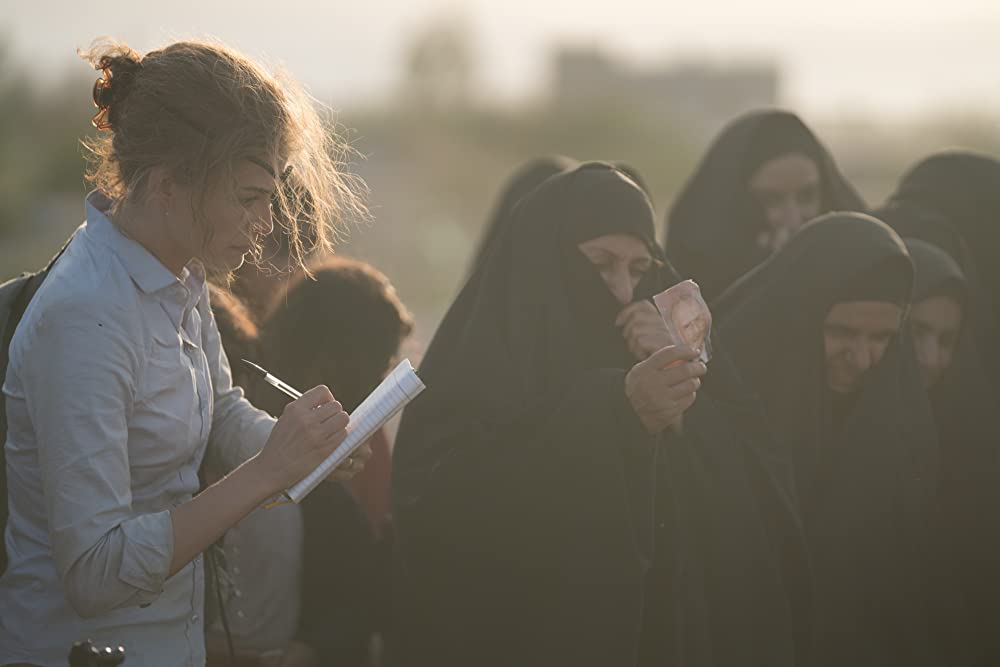Matthew Heineman’s A Private War is a timely emphasis on the importance of war reporting, and a more personal look at the toll such a job takes.
As one of the most celebrated and influential war correspondents in modern media, Marie Colvin saw more than her fair share of conflicts. And yet the focus of Matthew Heineman’s biopic is the conflict within Marie (Rosamund Pike) herself; literally, A Private War. It’s the debilitating effect witnessing so much trauma has on Marie as a human being, rather than as a journalist, that’s most prominent and effective here.
A Private War charts Marie’s career as she travels to warzones in Sri Lanka, Iraq, Afghanistan, Libya and Syria, alongside her photographer Paul (Jamie Dornan), and reporting to her editor Sean (Tom Hollander). The horrors of her work environment aren’t particularly soothed by her personal life either, as she struggles with messy relationships, burgeoning alcoholism and the cloying symptoms of PTSD.
Marie Colvin was a remarkable woman, and Rosamund Pike is fully committed in her portrayal. It’s a really impressive, immersed performance that isn’t too showy or caricatured, nor does it overshadow the supporting cast. (Which includes an unfortunately underutilised Stanley Tucci as Marie’s boyfriend Tony.) Heineman manages to centre Marie’s utter dedication to her work, and the upmost importance she placed on telling the stories of the civilian casualties most affected, without it feeling preachy and avoiding any hint of ‘white saviour’-ism. Instead, A Private War affirms the need for brave journalists like Marie who are willing to uncompromisingly tell the masses of the true spoils of war.

And it’s such that, despite being first released in 2018, the film still feels fresh in 2022. The insidious ‘fake news’ is not a particularly new concept, but its existence in the zeitgeist offers an opportunity to view films like A Private War in a new light. All reporting is inherently biased; a visceral reaction to something will undoubtedly colour the manner in which that something is reported, even if the journalist mostly sticks to the facts. By describing an act of violence as ‘unjustified’, a group of children as ‘innocent bystanders’ or a country as ‘besieged’, it gives the reader an immediate understanding of the writer’s position. Or on a broader level, a news report in the United Kingdom will be presented in a manner that aligns with the nature of a British audience; just as a French, an American or even a Russian report might.
That’s not to say the news is always ‘fake’ – although there are certainly some exceptions – or that journalists lack credibility. It just serves as a reminder that there’s a person behind the words in a newspaper. Marie’s exceptional reporting was testament to her bravery and passion for letting people see the realities of war. Heineman is consistently conscious of that, but also aware that a movie-going audience is just as engaged in the personal element. It’s not a perfect film; to begin with, Marie’s flashbacks and the manner in which her writing process is edited together feels a bit disjointed. But as the film progresses, it becomes more in keeping with Marie’s emotional state, and feels less jarring and easier to follow.
A Private War is a harrowing, immersive and compelling look at the life of a remarkable woman, and also at the cyclical and unrelenting nature of war. As Marie travels from Sri Lanka to Syria over the course of the film, it seems as though she encounters the same situation in each location. Extreme violence erupts as a reactionary result of a government with an agenda, and its people are caught in the crossfire. It’s an unintentionally timely look at the importance of telling the stories from ground zero; putting a traumatised face to a conflict happening miles away. But it’s also an effective look at human nature, at a woman’s struggle with the burden of having witnessed such cruelty, and having to then condense that horror into an article with a snappy headline.
A Private War is now available to watch on Blu-Ray, DVD & Digital.

